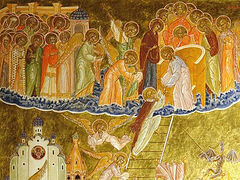This Lenten text is from the compilation entitled, A Treasury of Spiritual Wisdom, begun by Archpriest Mikhail Neigum and Georgiy Ponomarev (now Metropolitan Pavel of Ekaterinodar and the Kuban), using notes they took from patristic books, and finished by other seminarians of the Moscow Theological Seminary, who would later become: Hieromonk Abel, Priest Ioann Sirota, Igumen Andronik (Trubachev), Archimandrite Feofilact (Moiseyev), Priest Alexander Samoilov, and Hieromonk Rostislav (Oborotov).
There is temperance of the tongue—not talking very much and not talking emptily, controlling your tongue and not speaking evil or idly… not slandering someone to another… not criticizing your brother, not revealing secrets, minding your own business… There is temperance of the eyes—controlling your sight, not gazing attentively only at what is pleasant and looking at what is indecent… There is temperance also in hearing—controlling your hearing and not listening empty chatter… There is temperance in irritation—controlling your anger and not suddenly flaring up… There is temperance in glorying—controlling your own spirit, not desiring glorification, not seeking glory, not being haughty, not seeking honor and not placing yourself above others, not dreaming of praise… There is temperance in thoughts—overcoming thoughts through the fear of God, not leaning towards thoughts that are seductive and inflammatory, not being persuaded by them. There is temperance in food—controlling yourself and not searching for expensive foods or an abundance of various dishes, not eating outside the appointed time… not abandoning yourself to the spirit of gluttony, not being aroused by hunger and the quality of food, and not desiring now this, now another kind of food… There is temperance in drink—controlling yourself and not drinking wine without need, not searching for various drinks, not chasing the pleasure of drinking artfully prepared mixtures, abstaining from drinking, not only wine but even water, beyond measure… There is temperance in desires, in corrupt voluptuousness—controlling your feelings, not indulging in suddenly aroused desires, not being given to thoughts that suggest voluptuousness, not indulging in what will as a consequence arouse self-hatred, not fulfilling the will of flesh, but bridling the passions with the fear of God…
He is truly temperate who desires heavenly blessings and strives toward them with his mind, who turns away from fleshly desires, and is repulsed by flesh-pleasing… Temperate is he who does not like to look at female faces, is not captivated by others’ bodily appearance, is not lured by beauty, does not indulge in pleasant fragrances, is not caught up by flattering words, does not tarry with women, especially if they are immodest, and does not prolong discussions with women.
There is a great reward for temperance, and its grandeur knows know bounds. Therefore, truly blessed is he who has acquired temperance. Blessed are the temperate, for the delights of paradise await him. For this temperance by which you wore yourself out here, your beauty will shine in the Heavenly Bridechamber. The perfect goal of temperance is not malevolence, or the enfeebling of the body or rendering it unfit for anything, but to make it more fit for the soul’s movement. We should know that we take up the labor of bodily temperance in order by this fasting to attain purity of heart. But this labor is in vain if, knowing the goal, we tirelessly take up the labor of fasting, but cannot reach the goals for which we endure such sorrows. It is better to abstain from the forbidden food of the soul (i.e., sins and vices), than to abstain from foods that are not forbidden and are less harmful. For in this (bodily food) there is the simple and harmless use of God’s creation, not having any sin in and of itself. But in the other (food of the soul—vices) there is the destructive devouring of our brothers, about which it is said: Love not to speak ill, lest thou be cut off (Prov. 20:13). Remember that in visible temperance of the flesh there is not yet the fulness of perfection; that kind of temperance can be had by the faithless out of necessity or hypocrisy. Temperance is the possession of all the virtues, and that is why those who labor in asceticism must be temperate in all things (1 Cor. 9:25). When even the smallest member is taken away from a human body, that person’s whole appearance becomes deformed… So when someone takes care for only one virtue, the whole splendor of temperance is lost, although he may not see this. Therefore, not only should we earnestly acquire bodily virtues, but also those that have the power to cleanse our inner man. For what benefit, for example, is it to maintain bodily virginity when the soul fornicates with the demon of disobedience? Or how is one rewarded who has abstained from gluttony and all other bodily lusts, yet disregards boastfulness and vainglory, and is unable to endure the slightest insult, when he knows that the Light of Truth can balance the cup (reward) with righteous works only of those who did them in the spirit of humility? Whoever has devised the most abstemious life for himself and is satisfied with little, is glorious and great in soul.




